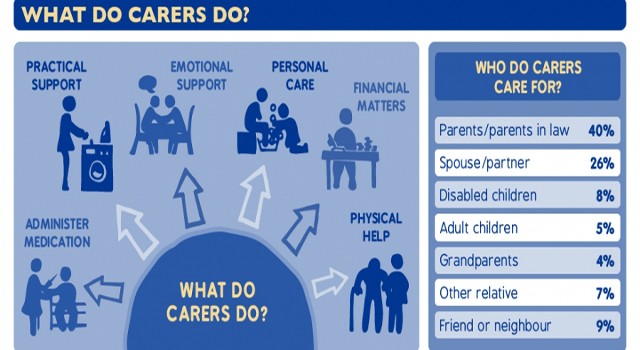National Carers Week was marked a few weeks ago, and we are taking a look at the support that carers provide to those who need them, as well as ways in which carers can ensure they themselves are well cared for.
The role of a carer is incredibly important, whether caring for relatives, friends, children or loved ones. It is often a role that is taken on without payment and yet can be extremely time consuming and emotionally and physically demanding. There are 6.5 million unpaid carers in the UK and these people save the UK economy some £119 billion every year so they really are a crucial part of our society.
Carers provide a range of different types of support, from emotional support, to practical care, administering medication, dealing with financial matters and providing physical assistance. Often the impact of becoming a carer can be hard to take – for example, 60% of carers have experienced a reduction in their income as a result of signing up as a carer.
With this in mind, it is important for those who are doing this essential work to make sure that they also care for themselves – if you are a carer (or you know someone who is) here are a few tips on how to make sure carers are cared for too:
1. Maintain a healthy diet and take plenty of exercise. When you’re putting someone else’s needs in front of your own the simple things like eating well and exercising can get forgotten. A balanced diet should include at least five portions of fruit and vegetables a day (fresh or frozen) and around 30% of what you eat should be made up of starchy foods, preferably those that are high in fibre such as wholemeal bread. Exercise will keep your heart strong, help reduce stress levels and keep you fit – aim for five 30 minute bursts of activities such as walking, swimming or even housework per week.
2. Sleep. Trouble sleeping can have a really negative effect on anyone, particularly someone who has taken on the responsibility of caring. Regular exercise, as described above, can be very helpful with sleep problems and learning how to relax is crucial too – try lying down, closing your eyes and tensing and relaxing each part of your body, from your toes to your head until you start to feel peaceful and heavy.
3. Take time for yourself. There is nothing wrong with taking a break from caring – in fact it is essential. Try to organise someone to take over even just once a week so that you can have a few hours to yourself to do what you need to do – ask friends or family or see if you qualify for respite care.
Carers need caring too. It’s important we acknowledge and appreciate the amazing work the UK’s carers do every day. If you are a carer and you need support, more information is available on these pages:
http://www.nhs.uk/CarersDirect/yourself/Pages/Yourownwellbeinghome.aspx
http://www.carersweek.org/







